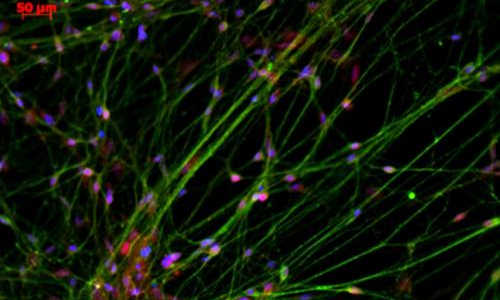The motor neurons that innervate muscle fibres are essential for motor activity. Their degeneration in many diseases causes paralysis and often death among patients. Researchers at the Institute for Stem Cell Therapy and Exploration of Monogenic Diseases (I-Stem – Inserm/AFM/UEVE), in collaboration with CNRS and Paris Descartes University, have recently developed a new approach to better control the differentiation of human pluripotent stem cells, and thus produce different populations of motor neurons from these cells in only 14 days.
Neurons (green) are detected by TuJI whereas motoneurons are revealed in red by the visicular transporter of acetylcholine. Credit: Inserm/Martinat, Cécile
This discovery, published in Nature Biotechnology, will make it possible to expand the production process for these neurons, leading to more rapid progress in understanding diseases of the motor system, such as infantile spinal amyotrophy or amyotrophic lateral sclerosis (ALS).
Human pluripotent stem cells have the ability to give rise to every cell in the body. To understand and control their potential for differentiation in vitro is to offer unprecedented opportunities for regenerative medicine and for advancing the study of physiopathological mechanisms and the quest for therapeutic strategies. However, the development and realisation of these clinical applications is often limited by the inability to obtain specialised cells such as motor neurons from human pluripotent stem cells in an efficient and targeted manner. This inefficiency is partly due to a poor understanding of the molecular mechanisms controlling the differentiation of these cells.
Inserm researchers at the Institute for Stem Cell Therapy and Exploration of Monogenic Diseases (I-Stem – Inserm/French Muscular Dystrophy Association [AFM]/University of Évry Val d’Essonne [UEVE]), in collaboration with CNRS and Paris-Descartes University, have developed an innovative approach to study the differentiation of human stem cells and thus produce many types of cells in an optimal manner.
“The targeted differentiation of human pluripotent stem cells is often a long and rather inefficient process. This is the case when obtaining motor neurons, although these are affected in many diseases. Today, we obtain these neurons with our approach in only 14 days, nearly twice as fast as before, and with a homogeneity rarely achieved,” explains Cécile Martinat, an Inserm Research Fellow at I-Stem.
To achieve this result, the researchers studied the interactions between some molecules that control embryonic development. These studies have made it possible to both better understand the mechanisms governing the generation of these neurons during development, and develop an optimal “recipe” for producing them efficiently and rapidly.
“We are now able to produce and hence study different populations of neurons affected to various degrees in diseases that cause the degeneration of motor neurons. We plan to study why some neurons are affected and why others are preserved,” adds Stéphane Nedelec, an Inserm researcher in Cécile Martinat’s team.
In the medium term, the approach should contribute to the development of treatments for paralytic diseases such as infantile spinal muscular amyotrophy or amyotrophic lateral sclerosis. “Rapid access to large quantities of neurons will be useful for testing a significant number of pharmacological drugs in order to identify those capable of preventing the death of motor neurons,” concludes Cécile Martinat.
Story Source:
The above story is based on materials provided by INSERM (Institut national de la santé et de la recherche médicale), Cécile Martinat





